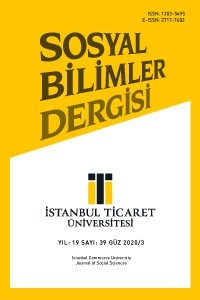FED FAİZ KARARLARININ ÜLKELER ÜZERİNDEKİ FİNANSAL ETKİLERİNİN İNCELENMESİ
Amaç: Bu çalışmada, Amerika Merkez Bankası (FED)’nın para politikası karalarının seçilmiş ülkeler üzerindeki etkilerini ortaya koymak amaçlanmıştır. Bu bağlamda özellikle politika faiz oranlarına odaklanarak FED faiz kararlarının ülkeler üzerindeki finansal etkilerini incelemektedir.
Yöntem: Çalışmada Ocak 2001- Aralık 2019 dönemi dikkate alınarak, FED politika faizi kararlarının BRICS (Brezilya, Rusya, Hindistan, Çin ve Güney Afrika) ve benzer mali ve ekonomik yapıları olması nedeniyle Türkiye’nin politika faizi üzerindeki etkileri analiz edilmiştir. Çalışmada hata düzeltme (VEC) modellerinden yararlanılarak politika faizleri arasındaki kısa ve uzun dönemli etki ortaya konmuştur. Çalışma kapsamında kullanılan veriler, Ocak 2001- Aralık 2019 dönemini kapsamakta olup Bloomberg’den elde edilmiştir. COVID-19 dönemi, farklı kırılganlıkların ortaya çıkması ve uygulanan politikalarn detaylıca incelenmesi açısından başka bir çalışma konusu olduğu için çalışma dönemi dışında tutulmuştur.
Bulgular: 2001-2019 dönemi için yapılan çalışma sonucunda ülkelerin politika faiz oranları ile FED politikaları arasında kısa ve uzun dönemli ilişki olduğu tespit edilmiştir. FED politikalarından uzun dönemde en çok etkilenen ülke Brezilya olurken, en kısa etki Güney Afrika için söz konusudur.
Özgünlük: Çalışmada elde edilen sonuçlar FED faiz kararları etkilerini tespit etmek ve uygun çözüm önerileri geliştirmek adına farklı öngörülerde bulunulması olanaklarını sunmaktadır. Bu doğrultuda FED faiz kararlarına karşı ülkelerin bundan etkilenmemeleri adına olanaklar geliştirmelerine ışık tutmaktadır.
Anahtar Kelimeler:
Para Politikası, Politika Faizi, Etkileşim, Finansal Piyasa
EXAMINATION OF THE FINANCIAL EFFECTS OF FED INTEREST DECISIONS ON COUNTRIES
Purpose: The aim of this study is to reveal the effects of the monetary policy decisions of the Federal Reserve Bank on selected countries. This study examines the financial effects of FED interest rate decisions on countries, focusing specifically on policy interest rates.
Method: The study analyzes the effects of FED policy interest rate decisions on Turkey's policy interest rate, taking into account the period from January 2001 to December 2019 and considering the BRICS countries (Brazil, Russia, India, China, and South Africa) and their similar financial and economic structures. In the study, error correction (VEC) models are used to reveal the short and long-term effects between policy interest rates. The data used in the study covers the period from January 2001 to December 2019 and was obtained from Bloomberg. The COVID-19 period is excluded from the study as it is a separate subject for examining different vulnerabilities and the detailed analysis of implemented policies.
Findings: As a result of the study conducted for the 2001-2019 period, it has been determined that there is a short and long-term relationship between the policy interest rates of the countries and the FED policies. While Brazil is the country most affected by FED policies in the long term, South Africa has the shortest impact.
Originality: The results obtained in the study offer the possibilities of making different predictions in order to determine the effects of FED interest rate decisions and to develop appropriate solution proposals. In this respect, it sheds light on the development of opportunities for countries not to be affected by the FED's interest rate decisions.
Keywords:
Monetary Policy, Policy Rate, Interaction, Financial Market,
___
- Ağıralioğlu, S. (2021). FED’in para politikalarının kırılgan beşli ülkeleri üzerinde yayılma etkileri: Panel VAR yaklaşımı ile modelleme. Finansal Araştırmalar ve Çalışmalar Dergisi, 13(24), 1 -15.
- Arora, M. V. B., & Cerisola, M. M. D. (2000). How does US monetary policy influence economic conditions in emerging markets? (No. 0-148). International monetary fund.
- Belke, A., Kösters, W., Leschke, M., & Polleit, T. (2002). International coordination of monetary policy (No. 4). ECB Observer.
- Büberkökü, Ö., & Kızıldere, C. (2016). ABD ve EURO bölgesi faiz oranlarının türk faiz oranı piyasası üzerindeki etkisinin incelenmesi. Beykent Üniversitesi Sosyal Bilimler Dergisi, 9(2).
- Eğilmez, M. (2009). Küresel Finans Krizi Piyasa Sisteminin Eleştirisi (4. b). İstanbul: Remzi Kitabevi. Kangal, M. (2021) FED'in para politikalarının gelişmekte olan ülkeler üzerindeki etkisi. Haliç Üniversitesi Sosyal Bilimler Dergisi, 4(2), 243-266.
- Kim, S. (2001). International transmission of US monetary policy shocks: Evidence from VAR's. Journal of monetary Economics, 48(2), 339-372.
- Kim, J. (2023). Stock market reaction to US interest rate hike: evidence from an emerging market. Heliyon, 9(5).
- Nieh, C. C., & Yau, H. Y. (2004). Time series analysis for the interest rates relationships among China, Hong Kong, and Taiwan money markets. Journal of Asian Economics, 15(1), 171-188.
- Kuttner, K. N. (2001). Monetary policy surprises and interest rates: Evidence from the FED funds futures market. Journal of monetary economics, 47(3), 523-544.
- Ogawa, E., Shimizu, J., & Luo, P. (2019). Effects of US interest rate hikes and global risk on daily capital flows in emerging market countries. Research Institute, 1-107.
- Parasız, İ., & Ekren, N. (2016). Uluslararası Finans ve Küresel Finans Krizi (2. b). Bursa: Ezgi Kitabevi. Tetik, M., & Kara, G.. (2020). FED ve TCMB politika kararları arasındaki stratejik etkileşimin testi: Toda-Yamamoto yaklaşımı. Ekoist: Journal of Econometrics and Statistics, (32), 35-47.
- Tetik, M. (2020). Testing of leader-follower interaction between fed and emerging countries’ central banks. The Journal of Economic Asymmetries, 22.
- ISSN: 1303-5495
- Yayın Aralığı: Yılda 3 Sayı
- Başlangıç: 2002
- Yayıncı: İstanbul Ticaret Üniversitesi
Sayıdaki Diğer Makaleler
FED FAİZ KARARLARININ ÜLKELER ÜZERİNDEKİ FİNANSAL ETKİLERİNİN İNCELENMESİ
YAYIN ÇAĞINDAN SOSYAL YAYIN ÇAĞINA: RİSK YÖNETİMİNDE BİR YAPAY ZEKÂ MODELİ ÖNERİSİ
Özel Öğretim Kurumlarında Kurumsallaşmaya İlişkin Okul Müdürlerinin Görüşleri
Yorumlayıcı Fenomenolojik Analiz
Seda YÜKSEL NALBANTOGLU, Osman BAYRAKTAR
Kadir GÖKOĞLAN, Nazan GÜNGÖR KARYAĞDI
Mevlüt CAMGÖZ, Sümeyye YILMAZTÜRK
